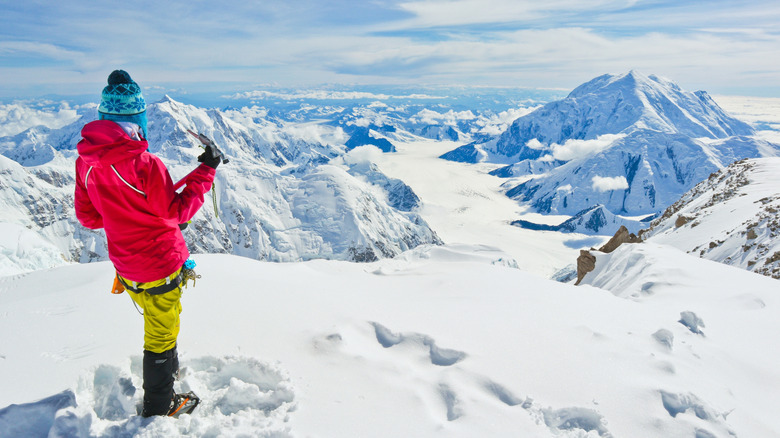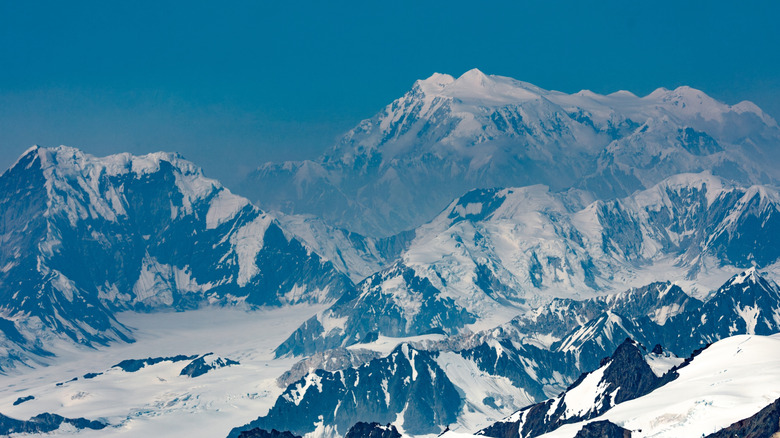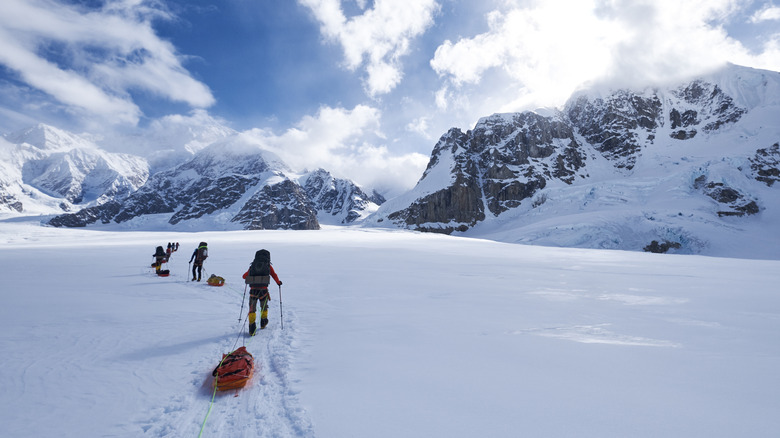Why An Expert Climber Thinks Canada's Tallest Mountain Is Harder To Summit Than Mount Denali
Mount Denali is the highest peak in North America, so it would be easy to assume it's also the hardest to summit. But when Explore spoke with expert climber Lisa Thompson, she wasn't so sure. Thompson brings a lot of experience to the question, having climbed the Seven Summits (the tallest mountains on each continent) as well as K2, the world's second-highest peak. She's also the owner and president of Mountain Madness, a mountaineering and trekking company that offers guided trips to some of the world's highest and most beautiful places, and the founder of Alpine Athletics, a company providing coaching for mountaineers.
Speaking with Explore, Thompson explained, "Although I've personally climbed Denali, I believe Mount Logan is the more difficult peak overall, and I'm becoming more interested in climbing it!" Mount Logan sits near the border with Alaska in Kluane National Park and Reserve in Yukon, itself one of Canada's most dangerous vacation spots. At 19,551 feet, Logan stands just a fraction smaller than Denali, which tops out at 20,310 feet.
But as Thompson points out, it's not just altitude that determines a mountain's difficulty: "Logan adds layers of challenge – its sheer size, complex glaciers, and unpredictable weather systems." Mount Logan's summit plateau alone is roughly 12 miles across, with multiple peaks rising from it. As Thompson says, "simply reaching the true summit can be a multi-day effort."
Mountains that test mind and body
Lisa Thompson readily states that both Denali and Mount Logan are tough climbs. As she told Explore: "Denali tests climbers with relentless hauling, altitude, and the grind of carrying everything you need for weeks." But Logan is a different, less traveled beast, as she explains."[Logan] sees far fewer attempts and summits, which speaks to the commitment it requires and adds to the challenge... Fewer established routes and little outside support mean you're truly on your own, which makes the climb as much a mental challenge as a physical one."
In contrast, Denali can get surprisingly busy. The National Park Service (NPS) tells climbers to expect between 500 and 600 others to be on the mountain during the peak season, so if you're looking to be at one with the mountain, Denali isn't it. But Logan might be! Only about 30 or 40 people take on Canada's highest peak each year. Reaching its summit often involves a mix of climbing, skiing, and ski-touring, while Denali is a relatively more straightforward trudge to the top. Parks Canada actually forbids solo climbing on Mount Logan because there have been so many rescues in recent years (two is the minimum group size). On Denali, solo climbs aren't banned outright, but traveling with a group is strongly recommended.
One of the reasons that climbing Denali and Logan comes with a hefty price tag is that many people (sensibly!) choose to attempt the summit with a guiding service. This can cost upwards of $10,000 for Logan and often $12,000 and up for Denali.
Weather and tackling the mountains
If you're planning to summit either mountain, timing your trip right is one key component of success. Lisa Thompson says that "On Denali, June usually provides the best mix of stability and snow conditions, though even then, success rates average around 50%." One reason is that climbers run out of time waiting out adverse weather conditions, according to the NPS. Similarly, late spring and early summer tend to offer the best window to tackle Logan, but the weather there is particularly extreme, and "storms can trap climbers indefinitely," Thompson says.
Of both mountains, Thompson writes: "Choosing an experienced team, planning conservative timelines, and building in flexibility often matter more than the calendar." She goes on to explain that "preparation, patience, and disciplined decision-making are what really tip the balance." For Thompson, Logan is "uniquely demanding." As she says, "Each peak demands respect, but Logan is in a league of its own when it comes to scope and commitment."


